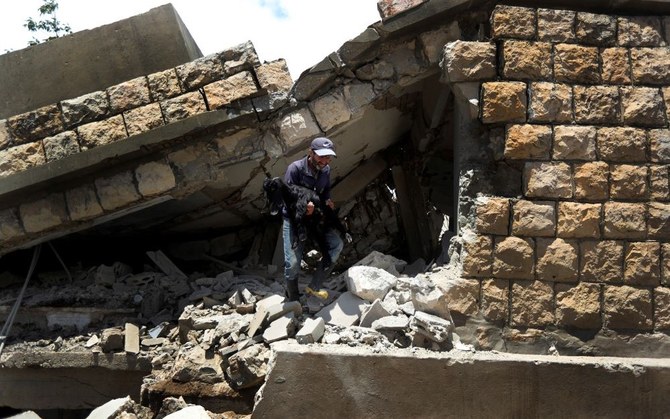BEIRUT: An Israeli military drone targeted a car in Tyre and a motorcycle in Qlaileh in southern Lebanon on Monday, killing a Hezbollah member and severely injuring another.
Hezbollah announced the death of the victim, identified as Mustafa Hassan Salman, born in 1991, from Qlaileh.
The Israeli military also hit a goat farm in Jabal Tourah in Jezzine, killing over 500 goats.
The reason for the expansion of hostilities, which violate the rules of engagement, remains unclear.
After targeting a Hezbollah operative in Deir Qanoun En Nahr three weeks ago, the Israeli military targeted Maaroub in southern Lebanon and Chaat in Baalbek–Hermel on Saturday and Sunday.
As well as expanding the scope of its operations, Israel is also penetrating deeper into Lebanon.
One political observer worried that “Israel, which probably doesn’t want to expand the war, might want to continue its assassinations and targeting of Hezbollah members in any Lebanese region, even if the war in the southern front came to an end.”
Israeli Defense Minister Yoav Gallant said on Monday: “We want to bring Hezbollah to reach an agreement that allows residents to return to their homes.”
Sunday was one of the most challenging days on the southern front, as Hezbollah carried out an operation in the Israeli Golan Heights in response to the assassination of Hezbollah member Maytham Mustafa Al-Attar in Chaat, Baalbek.
Israeli Army spokesperson Avichay Adraee said on Monday that the military “carried out Sunday night raids on Hezbollah’s targets in Lebanon, including a military site in Jabal Tourah, a Hezbollah weapons depot in Qabrikha, a military building in Tallouseh and facilities in Houla and Aita Al-Shaab.”
He added that the army carried out artillery shelling to remove threats in several areas in southern Lebanon.
A family in Marjayoun miraculously escaped death after a missile hit their home but did not explode.
Another rocket fell in Qabrikha, but did not explode either.
In response to the assassination of Al-Attar, Hezbollah launched a drone attack on Mount Hermon in the occupied Syrian Golan Heights where Israel has a key surveillance center.
It said this was its first such bombing since it began trading fire with Israel on Oct. 8.
The attack hit intelligence equipment and technical systems, causing a major fire, Hezbollah said.
Israel has key surveillance, espionage, and air defense installations on Mount Hermon where it overlooks the Syrian capital Damascus and monitors the rest of the country.
Hezbollah also launched dozens of Katyusha rockets at the Nimra base, marking the first attack in nine months of confrontations in the northern region near Tiberias.
Hezbollah targeted the newly established headquarters of the 91st Division in the Ayelet Barracks with dozens of Katyusha rockets, as well as military sites in Liman, Bayad Blida, Birkat Risha, Al-Raheb, and Al-Baghdadi.
Several American citizens and an Israeli settler were injured.
The Israeli military retaliated by conducting airstrikes on the town of Maaroub for the first time, targeting and destroying a concrete water storage tank.
Maaroub, in the Tyre district, is considered a stronghold for Hezbollah, as the hometown of former minister and co-founder Mohammed Fneish.
An Israeli warplane also struck a house in the town of Naqoura.
The Israeli military shelled the town of Bustane with phosphorus bombs, causing fires in agricultural fields and olive groves.
As part of diplomatic efforts, UN Special Coordinator in Lebanon Jeanine Hennis-Plasschaert has been conducting talks in Israel since Sunday after intensive discussions with Lebanese leaders and concerned parties to explore ways of de-escalation across the Blue Line.
Her office said in a statement that “her visit to Israel comes ahead of planned UN Security Council consultations on the implementation of Security Council Resolution 1701 of 2006 later this month.”
She said that discussions with Israeli officials focus on the importance of restoring peace and creating an opportunity for a diplomatic solution that allowed displaced civilians from both sides to return home. Additionally, they will address the outstanding provisions under Resolution 1701.
The Iranian Foreign Ministry warned on Monday that any “attack on Lebanon will create grounds for increased tension in the region and threatens its security and peace.”
The Iranian Foreign Ministry said in a statement that “defending Lebanon is a fundamental principle for us, and there is no doubt that we will support Lebanon against any Israeli aggression.”
It added: “Israel will bear the consequences of any attack on Lebanon, and the international community must assume its responsibilities.”


























